Deck 5: Sculpting Landscapes
Question
Question
Question
Question
Question
Question
Question
Question
Question
Question
Question
Question
Question
Question
Question
Question
Question
Question

Unlock Deck
Sign up to unlock the cards in this deck!
Unlock Deck
Unlock Deck
1/18
Play
Full screen (f)
Deck 5: Sculpting Landscapes
1
44)Which of the following weathering processes results in the reddish orange coating on rocks, in soils, and on metal (rust)?
A)salt crystallization
B)differential weathering
C)freeze thaw
D)oxidation
A)salt crystallization
B)differential weathering
C)freeze thaw
D)oxidation
oxidation
2
63)Which of the following was mentioned in the opening two-page spread of Chapter 9 (Sculpting Landscapes)?
A)canyons of the Colorado River and Green River
B)movement of material downhill on slopes
C)unusual shapes into which rocks are eroded
D)natural arches
E)all of these were mentioned
A)canyons of the Colorado River and Green River
B)movement of material downhill on slopes
C)unusual shapes into which rocks are eroded
D)natural arches
E)all of these were mentioned
all of these were mentioned
3
64)Which of the following regions was the focus of the opening two-page spread of Chapter 9 (Sculpting Landscapes)?
A)landscapes of Europe
B)swamps and other wetlands of the Everglades of Florida
C)canyons and other features near Moab, in central Utah
D)rain forests of Central America
E)none of these
A)landscapes of Europe
B)swamps and other wetlands of the Everglades of Florida
C)canyons and other features near Moab, in central Utah
D)rain forests of Central America
E)none of these
canyons and other features near Moab, in central Utah
4
65)Which of the following is a key part of the formation of most natural arches?
A)jointing and other fracturing
B)spheroidal weathering
C)volcanic eruptions
D)folding of soft rock layers
E)none of these
A)jointing and other fracturing
B)spheroidal weathering
C)volcanic eruptions
D)folding of soft rock layers
E)none of these

Unlock Deck
Unlock for access to all 18 flashcards in this deck.
Unlock Deck
k this deck
5
66)What type of feature is shown in this photograph? A stream flows through the feature and was involved in its formation.
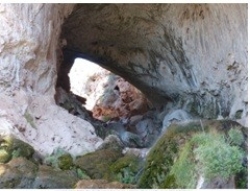
A)natural bridge
B)meteorite impact
C)crescent dune
D)natural arch
E)none of these

A)natural bridge
B)meteorite impact
C)crescent dune
D)natural arch
E)none of these

Unlock Deck
Unlock for access to all 18 flashcards in this deck.
Unlock Deck
k this deck
6
67)Which of the following is a key part of the formation of most natural bridges?
A)folding of soft rock layers
B)stream erosion
C)spheroidal weathering
D)volcanic eruptions
E)none of these
A)folding of soft rock layers
B)stream erosion
C)spheroidal weathering
D)volcanic eruptions
E)none of these

Unlock Deck
Unlock for access to all 18 flashcards in this deck.
Unlock Deck
k this deck
7
68)Which of the following regions was the focus of the Connections two-page spread of Chapter 9 (Sculpting Landscapes)?
A)landscape features of the Rocky Mountains of Colorado
B)rain forests of Central America
C)landscapes of Europe
D)swamps and other wetlands of the Everglades of Florida
A)landscape features of the Rocky Mountains of Colorado
B)rain forests of Central America
C)landscapes of Europe
D)swamps and other wetlands of the Everglades of Florida

Unlock Deck
Unlock for access to all 18 flashcards in this deck.
Unlock Deck
k this deck
8
69)Which of the following processes is probably involved in the formation of the landscape shown in this photograph from the Connections two-page spread?
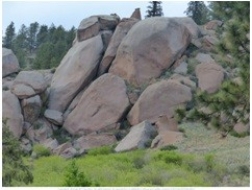
A)fracturing of an igneous rock, probably granite
B)spheroidal weathering
C)physical weathering
D)chemical weathering
E)all of these

A)fracturing of an igneous rock, probably granite
B)spheroidal weathering
C)physical weathering
D)chemical weathering
E)all of these

Unlock Deck
Unlock for access to all 18 flashcards in this deck.
Unlock Deck
k this deck
9
70)Which of the following processes is the most important process involved in the formation of the upper layer of the soil shown in this photograph from the Connections two-page spread?
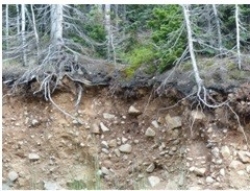
A)metamorphism
B)transport by wind
C)chemical weathering
D)transport by streams

A)metamorphism
B)transport by wind
C)chemical weathering
D)transport by streams

Unlock Deck
Unlock for access to all 18 flashcards in this deck.
Unlock Deck
k this deck
10
71)Which of the following processes is the most important process involved in the landscape shown in this photograph from the Connections two-page spread?
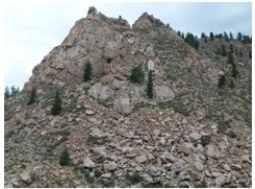
A)stream transport
B)stream deposition
C)movement driven by gravity
D)stream erosion

A)stream transport
B)stream deposition
C)movement driven by gravity
D)stream erosion

Unlock Deck
Unlock for access to all 18 flashcards in this deck.
Unlock Deck
k this deck
11
72)Which of the following observations is NOT true for the landscape shown in this photograph from the Investigation?
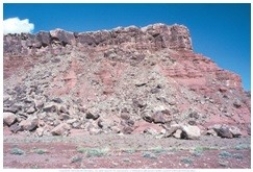
A)Joints were probably important in breaking rocks of the upper cliff into blocks.
B)The angular blocks indicate that glaciers are involved.
C)There are different layers of rock, responding differently to weathering because of their different properties.
D)The large blocks were probably derived from the upper cliff.

A)Joints were probably important in breaking rocks of the upper cliff into blocks.
B)The angular blocks indicate that glaciers are involved.
C)There are different layers of rock, responding differently to weathering because of their different properties.
D)The large blocks were probably derived from the upper cliff.

Unlock Deck
Unlock for access to all 18 flashcards in this deck.
Unlock Deck
k this deck
12
73)Which of the following descriptions best describes the landscape shown in this photograph from the Investigation?
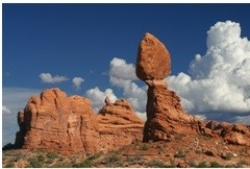
A)This scene could have been formed by erosion of a layer of sandstone.
B)The sparse vegetation and apparently dry conditions imply that chemical weathering is relatively rapid here.
C)There are no joints visible in the photograph, nor would any be expected in this type of rock.
D)The balanced rock formed during a volcanic eruption.

A)This scene could have been formed by erosion of a layer of sandstone.
B)The sparse vegetation and apparently dry conditions imply that chemical weathering is relatively rapid here.
C)There are no joints visible in the photograph, nor would any be expected in this type of rock.
D)The balanced rock formed during a volcanic eruption.

Unlock Deck
Unlock for access to all 18 flashcards in this deck.
Unlock Deck
k this deck
13
74)Which of the following processes is most important in sculpting the landscape shown in this photograph from the Investigation?
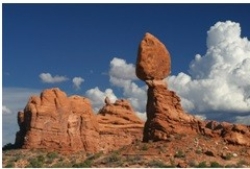
A)stream erosion
B)physical weathering
C)stream transport
D)glacial erosion

A)stream erosion
B)physical weathering
C)stream transport
D)glacial erosion

Unlock Deck
Unlock for access to all 18 flashcards in this deck.
Unlock Deck
k this deck
14
75)Which of the following observations is true for the landscape shown in this photograph from the Investigation?
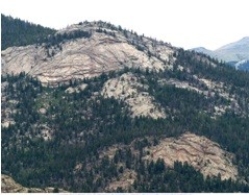
A)The main peak is covered by a thick soil near the top and on the steep cliffs.
B)The angular blocks indicate that glaciers are involved.
C)Fractures tend to follow topography, outlining somewhat rounded masses of rock.
D)There are many different types of bedrock, responding differently to weathering because of their different properties.

A)The main peak is covered by a thick soil near the top and on the steep cliffs.
B)The angular blocks indicate that glaciers are involved.
C)Fractures tend to follow topography, outlining somewhat rounded masses of rock.
D)There are many different types of bedrock, responding differently to weathering because of their different properties.

Unlock Deck
Unlock for access to all 18 flashcards in this deck.
Unlock Deck
k this deck
15
76)What type of feature is shown in this photograph? There is NOT a stream flowing through the feature or associated with its formation.
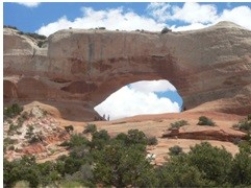
A)meteorite impact
B)crescent dune
C)natural arch
D)natural bridge
E)none of these

A)meteorite impact
B)crescent dune
C)natural arch
D)natural bridge
E)none of these

Unlock Deck
Unlock for access to all 18 flashcards in this deck.
Unlock Deck
k this deck
16
77)Which of the following was mentioned in the Connections two-page spread of Chapter 9 (Sculpting Landscapes)?
A)formation of soil by weathering
B)sand dunes
C)disintegration of granite by weathering
D)the role of the region's high elevations on weathering
E)all of these were mentioned
A)formation of soil by weathering
B)sand dunes
C)disintegration of granite by weathering
D)the role of the region's high elevations on weathering
E)all of these were mentioned

Unlock Deck
Unlock for access to all 18 flashcards in this deck.
Unlock Deck
k this deck
17
78)Which of the following processes is most important in sculpting the landscape shown in this photograph from the Investigation?
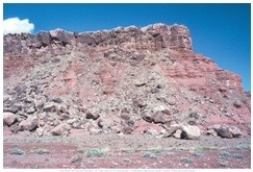
A)stream transport
B)movement driven by gravity
C)stream erosion
D)wind erosion

A)stream transport
B)movement driven by gravity
C)stream erosion
D)wind erosion

Unlock Deck
Unlock for access to all 18 flashcards in this deck.
Unlock Deck
k this deck
18
79)Which of the following processes is most important in sculpting the landscape shown in this photograph from the Investigation?
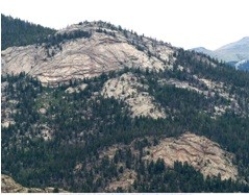
A)wind erosion
B)stream erosion
C)fracturing due to exfoliation
D)movement of blocks uphill

A)wind erosion
B)stream erosion
C)fracturing due to exfoliation
D)movement of blocks uphill

Unlock Deck
Unlock for access to all 18 flashcards in this deck.
Unlock Deck
k this deck


